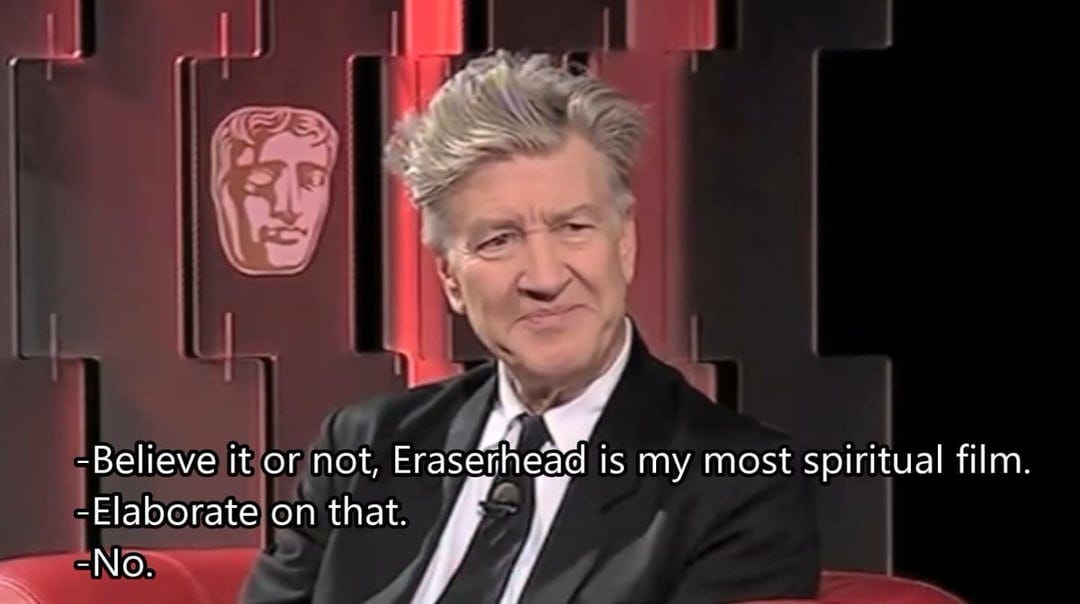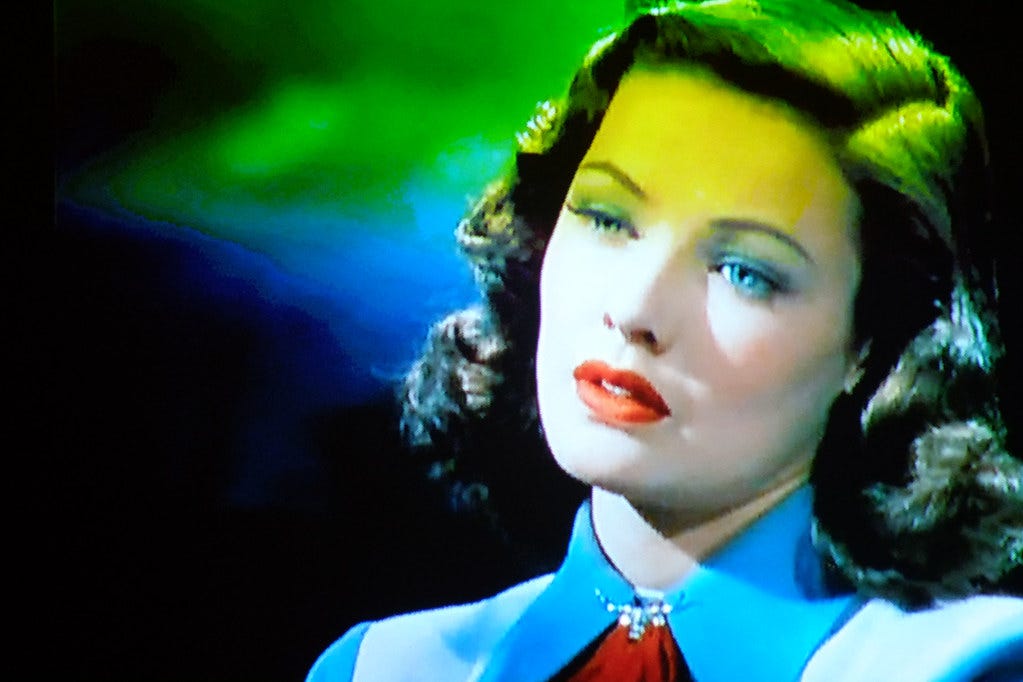David Lynch, master of the unconscious 1946-2025
"What a time to be alive if you love the theatre of the absurd"
I felt a weird shock last night at the news of David Lynch’s death, then surprise at discovering he was 78 when in my mind he is always in his 50s. This is because in my head it’s still the year 2000, which is when my brain was at its most plastic, absorbing life and art and culture through seventeen year old eyes. And those eyes were not even fully trained on Y2k, being as they were connected to a brain that had always been obsessed with Old Hollywood, black and white movies, or the minor works of Vivien Leigh. I was fully present in the year 2000 in a way that only the young ever are, but my cultural references were complicated. Just like the man himself.
That’s a suitably convuluted and digressing opening paragraph to a post on David Lynch, the convuluted king of digression. Take Mulholland Drive, a film whose first half is fairly conventional - well, as conventional as DL can be - and then takes a turn down a completely different boulevard, leaving you confused and exhilarated as you wonder what the hell is going on. I was working at my local cinema when it came out, and when my colleague asked me what it was like after I came out of an early late-night screening, I remember feeling dazed and replying that it was either the most incredible film I’ve ever seen or the most insane. I couldn’t decide. There was no way of deciding when you couldn’t work out exactly what you’d just seen.
And that’s how I feel about David Lynch movies. I don’t profess to be an ardent super fan - there are still a few I have yet to discover - and there have been moments during some when I have thought I’m not in the mood for this. His films are a mood. They are modern, daring, unconventional, and yet unapologetically obsessed with the past. His plastic brain absorbed the 1950s and a heavy dose of 40s film noir then shat it all out on contemporary screens in shades of Technicolor*. You don’t watch a David Lynch to understand, but to wonder. You don’t go looking for answers.
Keats said that a poem needs understanding through the senses. The point of diving in a lake is not to swim to the shore but to be in the lake, to luxuriate in the sensation of water. You do not work the lake out, it is an experience beyond thought. So too, is a David Lynch film. If you’re looking for answers or resolution, watch a Spielberg movie. If you’re more a Rilke/Lynch sort, then it’s enough to live the questions; the answers may (or not) eventually come.
Lynch always avoided explanations. He didn’t care how you interpreted his films or his paintings - that was up to you. He was a true outsider, both in Hollywood and life, and he didn’t care about conforming. This is why I love him, for the simple fact that I don’t love all his films. Those moments when I’m questioning it, when my mind isn’t sure if I’m quite up to the madness, when I’m feeling resistance to where he is taking me are SO important in cinema. I don’t want to walk out of a film totally satisfied, putting on my coat to ward off the chill as my thoughts turn back to appointments, to-do lists and bills. I want to walk out wondering. I want to forget to put on my coat. I want to be still turning over a scene as I drive home along my own lost highway, not needing to talk but to think.
He marched to his own beat. He got a fair few award nominations and an honorary Oscar, but it was never about the accolades for David Lynch. He just wanted to make whatever he wanted. He didn’t want to live in a box, even the weird surrealist box…see The Straight Story which showed he could do straightforward and sentimental if he felt like it. Then enter Mulholland Drive.
I read his book Catching the Big Fish years ago and immediately wanted to try Transcendental Meditation, but the religion I was in at the time strongly disapproved of anything that could bring peace that wasn’t directly connected to its own channel (which sadly never worked for me). In interviews he would describe spending two hours every day doing TM, that he considered it as essential to living as food and sleep. This was where he got his ideas, he said. He was a great advert for embracing the unconscious, a part of ourselves we still don’t truly understand.
Apparently Lynch had been displaced by the recent wildfires, and that even though his Laurel Canyon house was not in the evacuation area, he was forced to move because of the air pollution and his ongoing battle with emphysema. Perhaps the smoke was too much for his lungs, perhaps the sight of what was happening to his beloved LA broke his wild heart. Normally it irks me when I see the word passing used instead of died, but it feels right in this case. I don’t hold rigid beliefs in an afterlife - anything is possible is my mantra - but I can’t imagine all that energy and vibrant consciousness simply ending. He was tapped into something bigger than I can hope to understand, and just as he took us to other dimensions, perhaps now he is swimming along in some other consciousness, catching even bigger fish.
*Technicolor officially stopped being used in the 1970s







This is a lovely eulogy. I have to admit I didn't know much about him, but I did "enjoy" his works, in as much as I remember experiencing them quite vividly.
Twin Peaks was my unforgettable first exposure to his unmistakable style, and I couldn't look away, even as it fell apart into surreality towards the end of its run. Mulholland Drive challenged what I thought cinema was *for*. I remember scenes from that movie, to this day, in a way I just don't with scenes from other movies. That makes it art, in my opinion. It flicks a switch at some deeper level than just entertainment, whether or not you agree with it or love it.
Thank you for that Keats quote, too. I had never come across that before and it's beautiful!